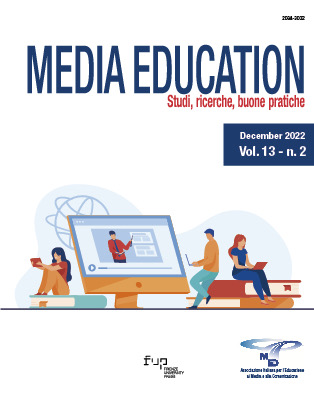Digital contexts mediated communication between teachers and parents: a transversal research in a multicultural school
Published 2022-11-15
Keywords
- communication,
- family,
- professional development,
- school,
- technology
Abstract
Mailing lists, social networks and group chats have become the stage of a very wide spectrum of formal and informal relationship dynamics where conflicts, discussions and misunderstandings are very common. Parents, school administrators and teachers experience situations which are often difficult to manage and where the boundaries between the private and the professional sphere are shady and often crossed. These complex dynamics, even more, complicated if one considers that schools are benefitted from families from different cultural backgrounds, are extremely difficult to investigate because they take place in border-lined spaces which often escape from the gaze of the school policies of the regulations and scientific debate. The research hereby presented, which has been in development for 18 months in a school institute in the metropolitan city of Bologna connoted by a very high degree of multicultural presence, aims to investigate how communicative exchanges mediated by digital contexts are able to influence the relational dynamics between teachers-teachers and parents-teachers.
References
Blau, I., Hameiri, M. (2017). Ubiquitous mobile educational data management by teachers, students and parents: does technology change school-family communication and parental involvement? In Educ Inf Technol, 22, 1231–1247.
Bordalba, M. M., Bochaca, J. G. (2019). Digital media for family-school communication? Parents' and teachers' beliefs. In Computers & Education. 132, 44-62.
Cifuentes, O. E., Lents, N. H. (2011). Increasing student-teacher interactions at an urban commuter campus through instant messaging and online office hours. In Electronic Journal of Science Education. 14(1).
Doering, A., Cynthia, L., George, V., Nichols-Besel, K. (2008). Preservice teachers’ perceptions of instant messaging in two educational contexts. In Journal of Computing in Teacher Education. 25(1), 5–12.
Eurostat (2019). ICT usage in households and by individuals. Eurostat Database, http://ec.europa. eu/Eurostat, last accessed 2022/07/07.
Goodall, J.S. (2016). Technology and school-home communication. In International Journal of Pedagogies and Learning. 11(2), 118-131.
Goodall, J., Vorhaus, J. (2011). Review of best practice in parental engagement. Department of Education, https://assets.publishing.service.gov.uk/government/uploads/system/uploads/attachment_data/file/182508/DFE-RR156.pdf, last accessed 2022/07/07.
Jenkins, H., Ito, M., boyd, d. (2016). Participatory culture in a networked era: a conversation on youth, learning, commerce, and politics. Cambridge: Polity Press.
IPSOS (2017). Il consenso in ambiente digitale: percezione e consapevolezza. Safer Internet Day.
ISTAT (2019). Cittadini e ICT. https://www.istat.it/it/files//2019/12/Cittadini-e-ICT-2019.pdf (2019), last accessed 2022/07/07.
Macia, M., Garreta, J. (2018). Access and digital literacy: barriers of the integration of ICT in family/school communication. In Revista de Investigación Educativa, 36 (1), 239-257.
McDermott, P., Rothenberg, J. (2004). Why Urban Parents Resist Involvement in Their Children’s Elementary Education. In Approaches to qualitative research: A reader on theory and practice.
Pasta, S., Marangi, M., Rivoltella, P. C. (2021). Digital Educational Poverty: A Survey and Some Questions about the Detection of a New Construct. In Proceedings of the 2nd International Conference of the Journal Scuola Democratica “Reinventing Education”, vol. 1, Citizenship, Work and The Global Age, (Associazione “Per Scuola Democratica”, 02-05 June 2021), Associazione “Per Scuola Democratica”, Roma, 697-709.
Potter, J., McDougall, J.: Digital media, culture & education. Theorising third space literacies. Pallgrave McMillian UK, London (2017).
Rivoltella, P.C. (2017). Tecnologie di comunità. Brescia: Scholé.
Save the Children. Riscriviamo il futuro: una rilevazione sulla povertà educativa digitale, https://s3.savethechildren.it/public/files/uploads/pubblicazioni/riscriviamo-il-futuro-una-rilevazione-sulla-poverta-educativa-digitale_0.pdf, last accessed 2022/07/07.
Selwyn, N. (2015). Data entry: towards the critical study of digital data and education. In Learning, Media and Technology 40(1), 64–82.
Smit, I., Goede, R. (2012). WhatsApp with BlackBerry; can Messengers be MXit? A philosophical approach to evaluate social networking sites. In 14th Annual Conference on World Wide Web applications (WWW). Cape Peninsula University of Technology.
Sweeny, S. M. (2010). Writing for the instant messaging and text messaging generation: Using new literacies to support writing instruction. In Journal of Adolescent & Adult Literacy. 54(2), 121–130.
Turkle, S. (2012). Alone Together: Why We Expect More from Technology and Less from Each Other. Basic Books.
Turkle, S. (2016). Reclaiming Conversation: The Power of Talk in a Digital Age. Penguin group USA.
Vuorikari, R., Kluzer, S., & Punie, Y. (2022). DigComp 2.2: The Digital Competence Framework for Citizens - With new examples of knowledge, skills and attitudes. Luxembourg: Publications Office of the European Union.

